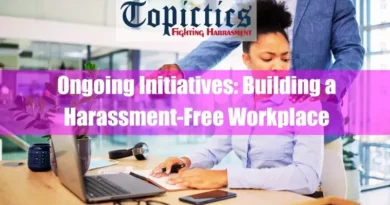Fear of Reprisal in the Workplace
Takeaways
| Key Points |
|---|
| Fear of reprisal is the apprehension of facing adverse consequences—such as career setbacks, social isolation, or termination—for speaking up about wrongdoing, expressing an unpopular opinion, or taking ethical actions. |
| This fear silences employees, rooted in power imbalances, lack of psychological safety, ineffective reporting systems, and personal anxieties, manifesting as self-censorship and withheld feedback. |
| The cost is immense: individuals suffer emotional distress and career stagnation, while organizations face eroded trust, stifled innovation, and potential legal ramifications. |
| To combat this, fostering psychological safety, strengthening reporting systems, raising awareness, and empowering employees are crucial strategies. |
| By prioritizing open communication, ethical leadership, and supportive policies, workplaces can cultivate a culture where diverse voices are valued and progress thrives. |
The Silence in Workplaces
Fear of reprisal is the apprehension of facing adverse consequences for speaking up about wrongdoing, expressing an unpopular opinion, or simply doing the right thing. This can include anything from getting passed over for a promotion to facing social isolation or even termination. It’s a form of intimidation that silences voices and prevents people from raising concerns or ethical issues. This article delves into the heart of this issue, exploring:
- Why employees fear reprisal, dissecting the power dynamics, broken systems, and personal anxieties fueling this silence.
- How fear manifests, uncovering the chilling ways it impacts individuals and organizations.
- The devastating consequences of unchecked reprisal, from eroded trust to stifled progress.
- Strategies to break the cycle, fostering a speak-up culture where voices are heard and valued.
Understanding the Why: Silencing Factors
Fear of reprisal, like a haunting melody, is composed of various instruments, each playing a distinct note in the silencing symphony. Let’s dissect these factors, understanding the complex arrangement that keeps many from raising their voices:
A. The Power Imbalance:
Imagine two voices, one booming, amplified by authority, the other hesitant, barely audible. This power imbalance, inherent in hierarchical structures, is a major player. Employees fear angering superiors who hold control over their careers, leading to:
- Demotions or missed promotions: The mere possibility of career setbacks silences even the boldest voices.
- Job loss: For many, speaking up is akin to playing career roulette, with the fear of losing their livelihood looming large.
- Social ostracization: Witnessing colleagues being ostracized for speaking up creates a chilling effect, discouraging others from following suit.
B. Lack of Psychological Safety
Imagine an orchestra where mistakes are punished, and open communication is discouraged. This lack of psychological safety fuels silence, where employees fear being judged or ridiculed. They:
- Self-censor: Ideas and concerns remain unspoken, fearing negative judgment or criticism.
- Withhold feedback: Constructive criticism becomes a potential weapon, avoided to maintain harmony.
- Engage in self-protective behaviors: Excessive documentation, avoiding sensitive topics, and walking on eggshells become the norm.
C. Broken Reporting Symphony:
Imagine a reporting system with malfunctioning microphones, amplifying whispers of doubt and silencing cries for help. Ineffective systems contribute to:
- Lack of trust: Confusing procedures and unclear channels make employees hesitant to report, fearing their concerns will be ignored.
- Unresolved cases: Past instances of retaliation or lack of action after reporting create a chilling precedent, discouraging future attempts.
- Fear of further harm: The possibility of facing additional pressure or even retaliation after reporting deters action.
D. The Bystander Effect:
Imagine a soloist falling onstage, the audience watching in stunned silence. Similarly, witnessing colleagues being reprimanded for speaking up creates a bystander effect:
- Social conformity: The desire to blend in and avoid attracting negative attention silences potential allies.
- Diffusion of responsibility: The belief that “someone else will speak up” leads to collective inaction.
- Fear of guilt by association: Supporting a colleague facing reprisal can bring unwanted scrutiny and consequences.
E. Personal Fears:
Beyond the organizational context, personal anxieties play a role:
- Social anxiety: Fear of public speaking or social interactions can make raising concerns daunting.
- Fear of conflict: Avoiding confrontation and maintaining harmony become self-preservation mechanisms.
- Lack of trust in leadership: If employees don’t believe leaders will listen or act fairly, silence becomes the safer option.
This intricate web of factors, like a haunting symphony, creates an environment where fear reigns supreme, silencing voices and hindering progress.
The Cost of Silence

Fear of reprisal, like a venomous snake, silently slithers through workplaces, leaving a trail of devastation. This silence isn’t just uncomfortable; it has tangible consequences for individuals, organizations, and society as a whole. Let’s explore the chilling chorus of its impact:
A. Individual Suffering:
For individuals, fear manifests in various ways:
- Emotional distress: Anxiety, stress, and fear take a toll on mental and emotional well-being.
- Career stagnation: Withholding ideas and concerns hinders growth and advancement opportunities.
- Loss of trust: Witnessing injustice silenced fuels cynicism and erodes trust in leadership.
- Whistleblower fatigue: Repeatedly facing retaliation or inaction can lead to disengagement and resignation.
B. Organizational Dysfunction:
Organizations pay a heavy price for stifled voices:
- Missed opportunities: Unreported issues like misconduct or safety hazards lead to missed chances for improvement.
- Decreased innovation: Fear restricts the flow of ideas, hindering creativity and innovation.
- Poor decision-making: Unchallenged assumptions and unchecked biases lead to flawed decisions.
- Eroded trust: A culture of silence breeds suspicion and damages employee-employer relationships.
- Legal implications: Unreported wrongdoing can escalate, leading to costly legal ramifications.
C. Societal Impact:
The impact extends beyond individual workplaces:
- Normalization of wrongdoing: When wrongdoings go unchecked, they become normalized, hindering ethical progress.
- Suppression of ethical concerns: Fear silences voices speaking up against harmful practices or societal injustices.
- Hindered progress: A culture of fear stifles progress on issues like diversity, equity, and inclusion.
Strategies to Mitigate
Fear of reprisal may seem like a daunting foe. Still, there are melodies of hope strategies that can empower individuals and organizations to break the cycle and foster a “speak-up culture” where voices are heard and valued. Let’s explore the instruments in this orchestra of change:
A. Building Psychological Safety:
Psychological safety, where individuals feel safe to express themselves without fear of negative consequences, is the bedrock of a speak-up culture. Here’s how to build it:
- Open communication: Encourage open and honest dialogue, actively listening to concerns and fostering respectful feedback.
- Transparency: Share information openly and transparently, building trust and demonstrating a commitment to ethical conduct.
- Diversity of perspectives: Value diverse viewpoints and experiences, creating an environment where all voices feel welcome and respected.
- Conflict resolution mechanisms: Implement fair and effective conflict resolution processes to address concerns constructively.
- Leadership by example: Leaders must demonstrate vulnerability, own mistakes, and actively promote a culture of open communication.
B. Strengthening Reporting Systems:
Effective reporting systems play a crucial role in encouraging individuals to speak up. Here’s how to strengthen them:
- Clear and accessible channels: Develop multiple reporting channels, including anonymous options, to cater to different comfort levels.
- Fair and prompt investigations: Ensure thorough and unbiased investigations are conducted promptly, addressing concerns swiftly and justly.
- Confidentiality and protection: Guarantee confidentiality for whistleblowers and implement measures to prevent retaliation.
- Support and resources: Provide whistleblowers access to confidential counseling, legal support, and other resources.
C. Raising Awareness and Education:
Education and awareness are essential for shifting mindsets and empowering individuals to speak up. Here’s how:
- Regular training: Conduct regular training on anti-retaliation policies, reporting procedures, and bystander intervention techniques.
- Success stories: Share success stories of effective reporting and positive outcomes to inspire and motivate others.
- Celebrate courage: Recognize and celebrate individuals who speak up and contribute to positive change.
D. Empowering Employees:
Empowering employees is crucial for building a collective voice against fear. Here’s how:
- Bystander intervention training: Equip employees with skills to intervene safely and ethically when they witness wrongdoing.
- Peer support and collective action: Encourage peer-to-peer support and facilitate collective action to address concerns effectively.
- Confidential counseling and legal resources: Provide access to confidential counseling and legal resources to empower individuals to speak up confidently.
Remember, this is not a solo performance; it’s a collective effort. Individuals, organizations, and policymakers all have a role to play.
- Individuals: Speak up, report concerns, support colleagues who raise voices, and hold leadership accountable.
- Organizations: Implement the abovementioned strategies, foster a culture of trust and psychological safety, and demonstrate a genuine commitment to ethical conduct.
- Policymakers: Strengthen whistleblower protection laws, enforce anti-retaliation policies, and promote ethical workplaces through legislation and awareness campaigns.
By working together, we can turn the tide against fear and create a symphony of voices, a chorus of progress, and a workplace where everyone feels empowered to speak up and make a difference.
The Road Ahead
The journey to dismantle fear of reprisal and cultivate a vibrant “speak-up culture” is an ongoing symphony requiring continuous efforts and adaptation.
Firstly, remember that building trust and promoting open communication is a marathon, not a sprint. Consistent commitment from leadership, transparent actions, and unwavering support for those who speak up are essential to sustain progress.
Secondly, the evolving workplace demands constant learning and adaptation. New challenges, technologies, and dynamics will emerge, necessitating regular assessment of existing strategies and willingness to implement innovative solutions.
Finally, let’s remember that this journey isn’t just about addressing fear; it’s about building a future where diverse voices thrive, ethical concerns are promptly addressed, and progress flourishes. Each individual, organization, and policymaker plays a role in composing this symphony of positive change. Let’s raise our voices, harmonize our efforts, and create a workplace where speaking up is not an act of courage but the natural rhythm of progress.
Conclusion to Fear of Reprisal
Fear of reprisal whispers in the shadows, silencing voices and hindering progress. This article aimed to spotlight its chilling impact and empower individuals and organizations to break free. By building psychological safety, strengthening reporting systems, raising awareness, and empowering employees, we can compose a new symphony where voices rise in unison, fostering ethical workplaces and societal progress.
Remember, this journey is continuous. Embrace learning, adapt to evolving landscapes, and hold yourselves and others accountable. Let’s not be passive listeners to the silent whispers of fear; let’s become active conductors, leading the way toward a future where speaking up is the norm, not the exception.
Together, we can dismantle the walls of silence and create a vibrant chorus of progress where every voice resonates.
FAQ
What about non-workplace situations?
While the focus is typically on workplace scenarios, fear of reprisal can occur in various settings, such as schools, communities, and online environments. The dynamics in these non-workplace contexts may differ, and strategies must be adapted accordingly. For instance, there might be concerns about bullying or social ostracization in schools. At the same time, online anonymity and cyberbullying may play more prominent roles. Tailoring responses to the specific environment is crucial to effectively address fears in these contexts.
What if my organization already has policies and procedures in place?
Having policies in place is an important starting point, but their effectiveness depends on several factors:
- Awareness and Accessibility: Ensure all employees know and can easily access these policies.
- Clarity: Policies should be clear and unambiguous, leaving no room for misinterpretation.
- Implementation Success: Evaluate if there have been successful cases where these policies were effectively implemented.
- Culture of Trust: A strong organizational culture that promotes psychological safety is key. Employees should feel comfortable using the established procedures without fear of reprisal. If these aspects are lacking, it’s vital to advocate for improvements or consider alternative reporting mechanisms.
What if I speak up and face retaliation?
Retaliation is a real concern, and unfortunately, it does happen. To protect yourself, document all interactions, including dates, details, and witnesses. Seek support from trusted colleagues, HR, or legal professionals. Remember, many countries have laws that protect whistleblowers from retaliation, so familiarize yourself with these legal protections. It’s essential to take action to safeguard your rights and ensure that retaliatory behaviors are addressed.
How can I deal with personal anxieties about speaking up?
Managing anxieties about speaking up can involve several strategies:
- Seek Support: Counseling, mentoring, and employee assistance programs can provide emotional and practical support.
- Preparation: Practicing what you want to say and preparing for possible outcomes can help build confidence.
- Join Support Groups: Being part of a group where others share similar experiences can be empowering and provide additional encouragement.
What about speaking up anonymously?
Anonymous reporting can be effective but comes with its own set of challenges. The success of anonymous reporting often depends on the organization’s commitment to investigating and addressing issues reported this way. Consider the effectiveness of the anonymity guarantee, the likelihood of a thorough investigation, and whether there are channels for follow-up communication. Balancing these factors can help you decide whether anonymous reporting is the right option.
What role can technology play in fostering a speak-up culture?
Technology can facilitate a culture of speaking up by providing tools for anonymous reporting, secure communication channels, and educational resources. However, it’s important to remember that technology is a tool, not a substitute, for building genuine trust and psychological safety within an organization. Integrating tech solutions should complement efforts to create an open, supportive workplace culture.
What are some emerging trends related to fear of reprisal?
As the workplace evolves, new challenges related to fear of reprisal emerge. For instance:
- Remote Work: The shift to remote and hybrid work environments can complicate the dynamics of reporting and retaliation.
- AI in Decision-Making: The growing use of AI in HR and decision-making processes raises concerns about bias and transparency, potentially increasing fears of reprisal.
- Legal Landscapes: The legal environment continually evolves, with new laws and regulations affecting how organizations handle complaints and protect employees from retaliation. Staying informed about these trends is crucial to ensure that anti-retaliation strategies remain effective.
What is whistleblowing, and why is it important in organizations?
Whistleblowing involves the disclosure by organization members (current or former) of illegal, immoral, or illegitimate practices under the control of their employers to entities capable of effecting action. It’s crucial for maintaining accountability and integrity within organizations, as it brings unethical behaviors to light.
How does retaliation manifest in the workplace?
Retaliation refers to adverse actions taken against individuals for engaging in legally protected activities, such as reporting misconduct. These actions can range from overt measures like termination and demotion to subtle tactics such as isolation and exclusion, all of which undermine fairness and justice.
What systems are considered ethical reporting mechanisms?
Ethical reporting mechanisms are systems and procedures established by organizations that allow employees to report misconduct confidentially and without fear of retaliation, fostering a culture of transparency.
What constitutes a protected activity under anti-retaliation laws?
Protected activities include actions such as filing or being a witness in an Equal Employment Opportunity (EEO) charge, complaint, investigation, or lawsuit; communicating with a supervisor about employment discrimination; answering questions during an employer investigation of alleged harassment; and requesting accommodation of a disability or for religious practice.
What is considered a materially adverse action in retaliation cases?
A materially adverse action is any employer response that might deter a reasonable employee from complaining about discrimination. This includes actions like termination, demotion, harassment, or punishment intended to silence or discourage individuals from participating in protected activities.
How does ostracism function as a form of workplace retaliation?
Ostracism involves excluding or ignoring an individual within the workplace, effectively isolating them from social or professional interactions. This subtle form of retaliation can lead to significant psychological distress and diminish the individual’s sense of belonging and contribution.
What is the chilling effect in the context of workplace reporting?
The chilling effect refers to the phenomenon where fear of retaliation discourages employees from reporting misconduct or unethical behavior. This fear creates a culture of silence, allowing wrongdoing to persist unchecked within the organization.
How does vicarious learning influence employees’ fear of reprisal?
Vicarious learning occurs when employees observe the consequences faced by others who have reported misconduct. If whistleblowers experience retaliation, it reinforces the fear of reprisal among other employees, deterring them from speaking up.
Why is psychological safety important in preventing fear of reprisal?
Psychological safety refers to an environment where individuals feel safe to take interpersonal risks, such as reporting unethical behavior, without fear of negative consequences. Establishing such an environment is crucial for encouraging open communication and ethical reporting.
What impact does fear of retaliation have on employees’ mental health?
The fear of retaliation can lead to heightened stress, anxiety disorders, and even depression. Living under the constant shadow of potential retaliation exacts a heavy psychological toll, affecting both personal and professional aspects of an individual’s life.
How does fear of reprisal affect an employee’s self-efficacy?
Fear of reprisal can erode an individual’s belief in their ability to effect change or handle challenging situations. This diminished self-efficacy may lead to decreased job performance and reluctance to engage in proactive behaviors.
What role do support systems play in mitigating fear of retaliation?
Support systems, including therapy, support groups, and trusted allies, provide the emotional backbone to face retaliation fears. They offer guidance, reassurance, and a sense of solidarity, empowering individuals to speak up against wrongdoing.
How can resilience training help employees combat fear of reprisal?
Resilience training equips employees with skills to adapt to stress and adversity, enhancing their capacity to cope with potential retaliation. This training fosters confidence and assertiveness, enabling individuals to stand their ground when facing unethical situations.
What is the significance of mindfulness in addressing fear of retaliation?
Mindfulness practices, such as meditation and deep breathing, help manage fear’s physiological and emotional impacts. These techniques promote a sense of grounding and calm, aiding individuals in navigating the stress associated with potential retaliation.









